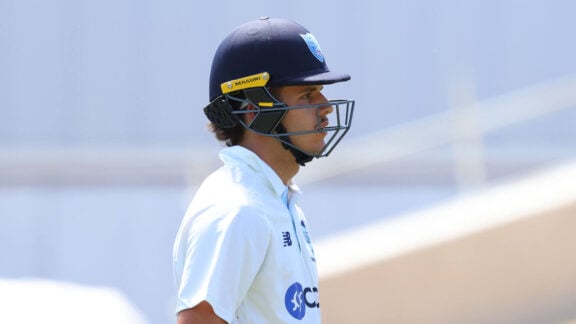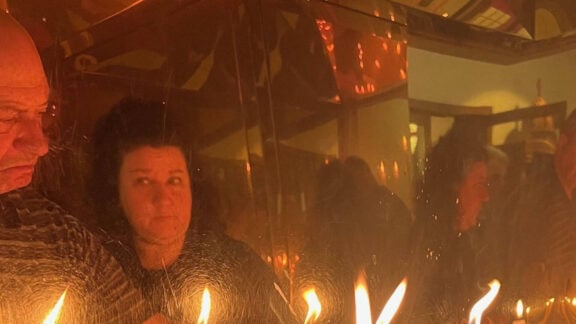Nick ‘Special K’ Kara – a wild, untamed spirit with a huge heart – grew up like many Greek-Australians in Melbourne: humble yet comfortable in the northern suburb of Northcote.
From a young age, the fighter-turned-coach was infatuated with martial arts, particularly karate.
He would frequent the film rental store ‘Stavros Videos’ and buy every Bruce Lee movie known to man. Kara was obsessed with the strikes, leaps, and fluidity of movement on display, and vowed to one day emulate his hero in the legitimate combat world.
During high school, Kara heard whispers from mates on the playground about a new kickboxing gym—something relatively foreign to Melbourne at the time—and quickly decided to jump on board. At 13, he began practicing Zen Do Kai under trainers Con Andrianopoulos and George Papadopoulos, based at Bob Jones’ gym near the Northcote Police Station.
Slowly developing his fighting skills, Kara undertook his first two legitimate Zen Do Kai bouts at the age of 15—one at a venue on Flinders Street, and the other at Fitzroy Town Hall. The Greek-Aussie continued to have semi-professionally sanctioned fights, even transitioning into the boxing arena at ages 17, 19, and 21.
Before his involvement in combat sports, Kara describes his early childhood as “fighting without a safety net”.
“My father was never around,” he reflects. “And I believe that if he was, I could’ve had 150 fights under my belt. But I had no one to push me—only myself.”
Kara’s mother worked three jobs just to keep a roof over his head. “She was a stalwart. I don’t know where I would be without her.”
For the fighter, combat was both an escape and a purpose beyond the banalities and repetition of daily life. Nevertheless, his training was inconsistent due to the demands of his work.
“I became a mechanic, then a truck driver, and finally I’ve ended up as a cornerman and a trainer,” he laughs. “But even then, I never gave up training wholeheartedly. I was always doing something. Fighting was still my passion.”

After sustaining a serious back injury on a job site—which included multiple bulged discs—Kara was sidelined for many years but nonetheless kept up his training. He maintained a decent level of boxing technique and physical fitness by training with greats such as Ron Parr, Nick Talakouras, Dana Godson, Sifu Robert McInnes, and Stan “The Man” Longinidis. At 26, Kara made his long-awaited comeback in the ring, amassing a total of 17 professional bouts.
At the ripe age of 32, seemingly out of nowhere, Kara was called up for a fight in Las Vegas against the notorious U.S. fighting legend Mason Gibson. The Melbourne-born fighter had only 12 bouts under his belt at the time, and with no proper training camp leading up to the fight, he was still able to win on points.
“It was surreal, I truly could not believe it,” he states, grinning. “My attitude coming into it was, ‘f*** it, let’s do it,'” he laughs. “And it paid off! I flew back home to Melbourne as a world champion—but it didn’t sink in for another two weeks.”
After riding the high of victory for quite some time, Kara relocated to Thailand for four years to try his hand at the Southeast Asian fight scene. He fought frequently, defeating an Asian Games gold medallist by TKO early on, supported by an efficient training camp led by Kyokushin aficionado Judd Reid. The two ended up teaching classes at the renowned WKO gym under Kara’s old friend, Sifu Robert McInnes.
It’s clear that the fighter’s boundless curiosity and insatiable drive led him down a variety of life’s corridors—not just within martial arts.

“Living in Thailand, I also acted in a bunch of films and commercials, including the Thai cult classic ‘Ong Bak.’ I always played the bad guy. Most of the projects involved some type of acrobatics or stunts, which—obviously, being a fighter—I’m pretty good at. But media was never something I sought out. It kind of just fell in my lap.”
His unexpected success in TV and film arguably culminated when George Sotiropoulos, his old friend and fellow martial artist, brought Kara into a role on The Ultimate Fighter: Australia vs UK (“The Smashes”) as a striking coach.
Unable to resist such an opportunity, Kara flew over for six weeks to train some of the country’s best contenders—including former UFC champ Robert Whittaker—before getting into a heated altercation with the English striking coach.
“I don’t like being disrespected, by anyone. I can’t stand it. It’s not how I’ve grown up,” Kara reflects. “I shouldn’t have reacted, but it is what it is.”
The altercation escalated to the point where UFC CEO Dana White had to step in to defuse the conflict.
“Looking back, it probably made for good television, but it wasn’t my finest moment.”
Returning to Thailand, he began, by his own admission, to spiral.
“I started losing control,” he says. “Life in Thailand became more about partying than self-improvement. It led me down a bad path, for sure.”
His descent hit rock bottom when he fell seriously ill and was hospitalised for four months in Thailand in 2013. Facing death, being shackled to a Thai medical centre bed forced the then mid-30s fighter into deep reflection.

“I realised I had lost myself to excess,” he states pensively. “I came to the conclusion that I never had a mentor in my life. I never had someone to guide me. I had to learn from my mistakes the hard way.”
But it wasn’t all doom and gloom. Like all heroic stories, there was a shining light at the end of the tunnel—a massive shift in perspective that changed the course of Kara’s life, maybe even saving him from death itself.
“I suddenly felt deep in my heart that my experience in life needed to be an example—a cautionary tale—for younger fighters, showing them what not to do.”
With this mindset shift, Kara met his now-wife at the end of 2014, before returning to Australia to coach in 2018. While he felt he’d lost his passion for the sport, his good friend Faisal Fayad convinced him to join FightFit Boxing Centre in Collingwood—where he slowly fell back in love with fighting.
“I loved, and continue to love, the atmosphere at FightFit. It gave me a new sense of purpose, and I loved the people I was working with.”
Now operating from a far more grounded place in life, the former fighter—alongside business partner Bash Sinha—opened his own FightFit venue in Moorabbin and currently trains 64 kids in his Teen Striking course.
“Now, I’m simply dedicated to teaching my students not only how to fight, but how to avoid the pitfalls I fell into. I want to teach them that fighting is not about hurting others—it’s about overcoming the obstacles of life and pushing forward. That’s what it means to be a champion.”








